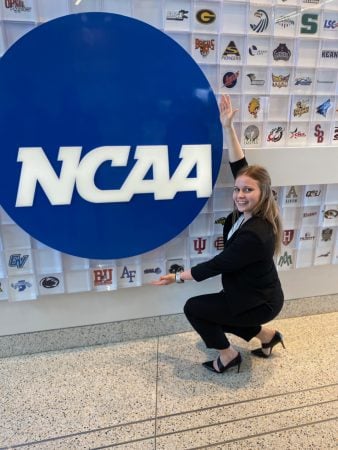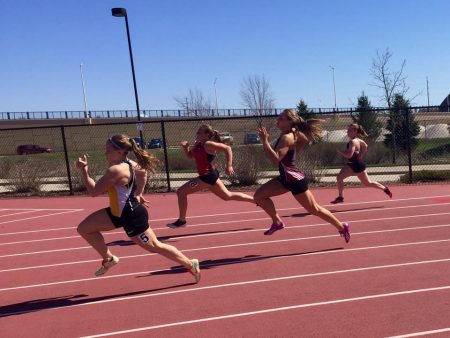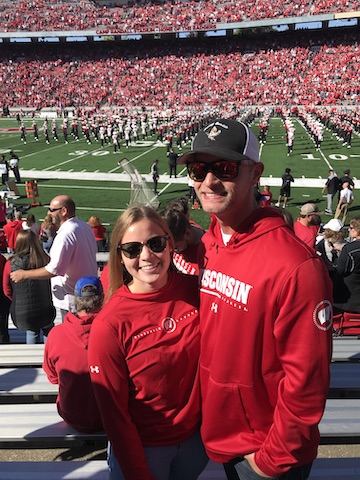Jamie Dompier ‘17 earned her Bachelor’s of Science degrees in Sports and Fitness Management and Management at Michigan Technological University. She has since embarked on a successful career in Sports Administration, currently serving as Assistant Director of Business Operations for Wisconsin Athletics. Prior to starting at the University of Wisconsin-Madison In September 2022, Dompier worked in the athletic departments at Virginia Commonwealth University and Texas A&M University. Here is an account of the race she has run.
Dompier Starts the Sports Administration Race at Michigan Tech
As a runner, Jamie Dompier knew where the finish line was and how to get there quickly and effectively. Her initial race plan was to study biological sciences and become a physician’s assistant in orthopedics or sports medicine. But as orientation at Tech neared, it seemed like the wrong race for her. “I realized while the health field is cool, it just didn’t feel like it was the right fit for me,” she said. “I still wanted to be involved in sports, though.”
Recruited to run track for Michigan Tech, Dompier arrived on campus in the summer of 2013. She switched majors to sports and fitness management. And like most first-year students, she made another change. “I decided if I wanted to be in sports administration, I should have more of a business background. So that’s why I added a second degree in management,” she said. “For me, knowingly wanting to be in sports administration meant that I should have a broad business background so I can have a grasp on all aspects. The sports industry has everything from accounting/finance, marketing/promotions, sports medicine/athletic training/nutrition, compliance, human resources, development, etc. That was the reason why I got the two bachelor’s degrees.” The decision added an extra semester and some summer school to her graduation race and end goal of sports administration. But it was a wise decision in the long run.
An All-Around Training Program to Prepare for Sports Administration
Michigan Tech’s sports and fitness management degree program gives students a broad look at a growing industry (sports and fitness management jobs are growing at almost a 20% clip). Students get a glimpse into both the sports and fitness sides. “You took classes for sports management, like facilities, sports law, and sports administration. Those were the classes I really enjoyed,” she said. “And then there were these fitness classes, biomechanics, anatomy, physiology, and athletic training. And now they have sports finance, which I would have really loved. Tech allows you to specialize in one side or the other, but I think it’s still personally good knowledge to know and understand both sides.”
In track and field, having a good coach who has run and succeeded competitively is a big plus for the runner. The coach knows exactly what the athlete is experiencing or will experience and can help her prepare. Taking classes from sports professionals was a similar experience for Dompier.
“It was great having the athletic department staff teaching classes. They had industry knowledge. Hearing about their experiences in the real world was really applicable.”
Two Internships as Impactful as Two-A-Day Training
Athletes gain significant benefits from two-a-day training, especially early in preparing for their season. Internships give students valuable applied learning in their chosen field. They hone the skills they will need after they graduate and can determine if a job or industry is going to be the right fit. The sports and fitness management degree requires one internship. Dompier did two!
In the summer of 2015, Dompier worked as the NCAA Compliance and Student-Athlete Services Intern, where she got to see the internal workings of an athletic department. She gained experience with NCAA student-athlete databases like Compliance Assistant and LSDBi. She created athletic grant renewals and revised the policies and procedures manual. Jamie developed online compliance forms using Front Rush software and the student-athlete code of conduct in PowerPoint. Finally, Dompier updated incoming freshmen student-athlete compliance forms. It offered a different perspective from her experience as a student-athlete.
She served as the Sports Intern in Wisconsin Dells at Woodside Sports Complex during her second internship. Dompier learned a great deal about event and facility management. She assisted sports directors and oversaw operations during soccer and lacrosse tournaments, and supervised evening soccer leagues. And she gained experience in sports finance, collecting league payments, revising contracts for future tournaments, and creating invoices for past tournaments. “I’m glad I actually did two internships just to get more experience and see different areas,” Dompier said.
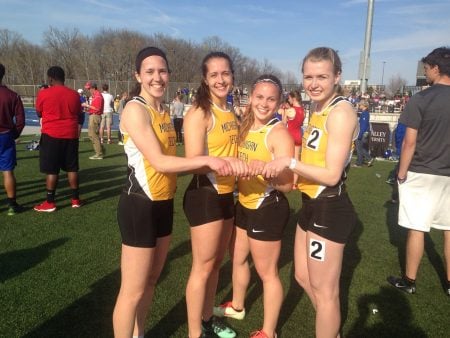
Running Your Best Sports Administration Race Requires Networking
To be a successful runner, Dompier found it was up to her. Whether pushing herself in training, eating and hydrating well, and managing her time, her success was predicated on her decisions. She had to work at it. College was the same way for her— classwork, jobs, and internships. “It’s really up to you to make the most of it. You gotta go get it,” she said.
Experience has taught her the value of networking and internships. “This is an industry where you really have to put an effort in,” she said. “Get into it. Those internships do matter and building those connections, and those relationships really do matter, too. And I think that’s something that a lot of people take for granted and don’t realize how important they are to do.”
Looking back, she regrets not networking more when she was in high school and college. Her advice to aspiring sports and fitness management professionals: networking.
“So if you’re a senior in high school and you think that you know you want to be an athletic trainer or you want to be in sports medicine, or you want to be in communications for an athletic department, talk to the people at your local college or university. Growing up in Chassell, Tech was just down the road. It would have been easy to talk to people there,” she said.
“If there’s a school and it’s your dream to work there, look at their staff directory, reach out to somebody that’s in that department, and see if they can take some time to talk to you about their experiences, how they got there. Learn about them and what they do. And you know what? They’ll have suggestions specifically for you to get into that area,” Dompier said.
Graduate School Research Instrumental To Dompier’s Race Success
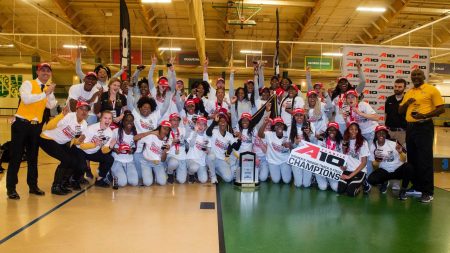
Dompier found the business classes she took as an undergraduate to be invaluable. She felt she needed to get a graduate degree in sports administration or her MBA if she wanted to pursue a sports administration career. “When I was considering grad school, I was having a hard time deciding between pursuing a master’s for sport administration or an MBA,” Dompier said. I was pretty open about location as I thought it would be a great experience regardless of where I went so that didn’t concern me in my decision making.”
Dompier felt a graduate assistant (GA) position would be beneficial in getting a leg up on the competition when she entered the job market after graduate school. “This was important to me to gain experience and get some financial assistance,” she said. “Another contender was what type of master’s program I wanted to pursue (sports administration or MBA). I actually started searching for graduate assistant positions on the NCAA Job Market website. When I saw GA positions that looked interesting to me, I researched the university’s graduate programs to see what they had. I looked at the length of the programs, cost of attendance, etc. I also looked at their athletic department’s web page to learn more about the department—what NCAA division they were, their conference, what sports they had, and review their staff directories.”
Dompier Continues The Race at Virginia Commonwealth University
That’s when Dompier came across Virginia Commonwealth University (VCU). “As I was searching, I saw that VCU had a bunch of positions posted (including as a GA in track and field, a role she would later get). Then I looked at their academic programs and found that VCU’s Center for Sport Leadership had a dual master’s program where I could pursue a Master of Sports Leadership and an MBA and finish both programs in two years. To me, it was a no-brainer.”
As she started graduate school, Dompier was unsure of where in the sports industry she wanted to land. She took it one day at a time, enjoying her role as a GA. “I absolutely loved working with that coaching staff and primarily their sprints/jumps event groups,” she said. “During my first semester at VCU, I was taking the sports business class and that’s when it clicked for me – I wanted to be on the business side of sports. I met with the Assistant AD for Business Operations and he offered me a GA position which I started after my first spring semester. I am still so grateful for all of the folks at VCU for their support and how awesome they were to work with.”
“If you want to go to grad school I would suggest you look early. Find some areas you want to go and definitely look for grad assistant positions, because that gives you all the more experience and that’s what I had at VCU, and I’m really grateful for it.”
Go for the Sports Administration Finish Line
Dompier sees a lot of potential for students choosing to study sports and fitness management. “If you’re a high school senior and you’re going into sports and fitness management, the world’s your oyster. You have a lot of potential to go in different directions, learn and experience a lot.”
Dompier has experienced much since her days at Tech. As a GA in the Athletic Department at VCU, she managed purchasing and travel. She worked with a variety of systems to ensure purchases complied with university, state, and NCAA policies and that expenses were reconciled with bank statements at the end of the month.
Dompier started as a Business Coordinator at Texas A&M before her promotion to Assistant Manager of Internal Operations. Her responsibilities increased in the larger athletic department. She gained responsibilities in financial reporting and managed the department’s day-to-day operations of accounts payable. Other duties included the management of inventory processes and other accounting responsibilities.
At Wisconsin, Dompier oversees the daily management of the Ticket Office and UW Foundation revenue. She manages procurement and corporate card expenses for a number of sports and units which entails reviewing expense reports for accurate receipts; ensuring compliance with state, university, and NCAA rules and regulations; completing internal account coding; and reconciling against US Bank statements.
It’s been a race Dompier thinks any Michigan Tech sports and fitness management graduate can run and win if they want it enough. “If you really want to be in the sports industry, I mean, you really gotta go get it,” she said. “You can’t just expect to get into the industry. I mean, you really, you really do need to make a push for it.”
